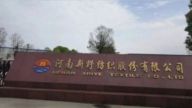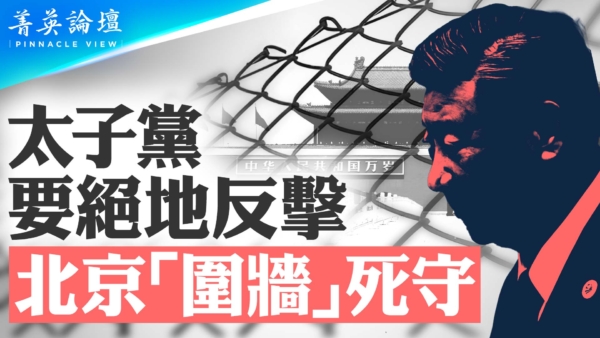【新唐人2013年01月12日訊】2012年年底召開的中央經濟工作會議上,地方、中央部委把經濟、金融問題指向中央,地方和中央部委之間也互相指控揭黑,就經濟工作提出916條意見和建議。 28個省(區)、直轄市在會議上,要求新一屆的國務院一次性註銷省級政府所有已到期或已拖欠的債務——4萬1千億元。外界指出,中共為了擠入世界強國之列,多年來在GDP上「大放衛星」,造成中國經濟走入無解的死胡同。
這次中共中央經濟工作會議適逢中共換屆年。據香港《爭鳴》雜誌報導,會議期間,各地方、中央部委辦負責人就經濟工作提出916條意見和建議。其中有近700條是指責、批評、質問本屆政府的經濟、金融政策的決策及措施。
各地方欽點了國務院隸屬16個部委局的大名,指責、抨擊16個部委局是影響宏觀調控、和經濟持續健康發展的阻力。
美國南卡羅萊納大學艾肯商學院教授謝田:「我覺得各地諸侯準備躍躍慾試,要挑戰中央的集權統治了,中央的集權統治現在已經在四分五裂、土崩瓦解之中。地方政府敢於這樣做,是可能看到了一些苗頭,現在正好是爭權、爭地位的時候。」
28個省(區)、直轄市在會議上要求中央能從全盤、中長戰略考慮,一次性註銷省級政府所有已到期或拖欠的債務。據了解,省級政府「到期債務」有1點22萬億元、「到期拖欠債務」2點88萬億元,共計4萬1千億元。
地方黨政負責人認為,大量債務是中央決策造成的,他們說,當年借貸是經「黨政班子」集體討論決定的,是經國務院審核批准的,如果沒有這一借貸,工程怎麼能上馬﹖國民經濟產值怎麼增長﹖
謝田:「以前我們看中共的經濟會議都是開會了,確定一個GDP的數字,下面就開始造假。反正你上面開了綠燈,開始把錢借來,開始建房子,然後拆房子,建了又拆,拆了又建,把數字搞上去,皆大歡喜。惡果出現以後,就開始追究責任了。」
謝田指出,28省市要求中央一次性註銷4萬多億欠債,等於地方政府在與中央攤牌。也就是說,中央不給地方註銷4萬多億元,地方政府破產,你中央政府也吃不了兜著走。
旅美中國問題研究人士 張健:「我認為中國很多地方財政已經基本枯竭了,大部分一二三線城市,可以說是面臨破產的邊緣。地方政府有兩種手法,第一種手法是全面的否定上一屆政府來解脫自己﹔第二是,去揭發同省市這樣人員,來證明自己是在一種被逼無奈的經濟大潮中,捲入了一種不可避免的漩渦,來試圖阻擋自己在政績上的滑坡,以及人民對當前的經濟形式非常不滿。」
據報導,中央經濟工作會議上曾計劃制定2013年的GDP增長目標,但因中央內部和中央各部門間、以及各省(區)、直轄市內部,都有種種困擾和爭議,最終GDP增長目標沒有定論。
《爭鳴》雜誌評論指出,如今中共已成為一個沒有獨裁者的獨裁政權,內部派系鬥爭白熱化﹔新屆政治局常委會中「帶病」晉升的佔多數,名曰「弱常委制」。於是地方政府坐大,使著勁借貸,使著勁貪錢,建了房屋、公路、橋樑又炸毀、拆除。「建」算一份GDP,「拆」也算一份GDP ,全都成了政績。如今,地方政府背了大筆債務,按說都破產了,卻要中央一筆規劃資金,準備一次性花完了,貪完了,拿了外國護照走人,這就是「中國特色社會主義經濟」!
採訪編輯/ 劉惠 後製/周天
China Central Economic Work Conference Becomes a Meeting Exposing
In 2012, the China Central Economic Work Conference
(CEWC), local divisions and central ministries blamed
the central government, for problems with the economy.
Local divisions and the central government
ministry exposed each other’s corruption.
In the end, 916 suggestions had been raised.
Attendees came from 28 provinces, requesting the new
administration to write off all provincial-level’s debts.
These debts had reached 4.1 Trillion
Yuan, equivalent to US$641.62 Billion.
Outsiders said that in order to become a leading
country in world, the Chinese Communist Party
(CCP) created fake GDP’s over the past years.
It caused China’s economy to now run into a dead end.
The CEWC was held when the CCP
were undergoing a transfer of power.
Hong Kong’s Cheng Ming magazine reported that in the
meeting, local divisions had 916 economic suggestions.
Almost 700 of those were focused on blaming,
criticizing and questioning the new administrative
economic plan, financial plan, and measures.
Local divisions highlighted 16 ministries and bureaus,
which under the state council’s management,
had an impact on macro-control, and became
the obstacles of healthy economic development.
Xie Tian, a professor at the Aiken School of Business
at the University of South Carolina: “I think local
divisions are ready to challenge the central authoritary.
The central regime has already fallen apart and is collapsing.
Local divisions dare to do this, as
maybe they had observed this trend.
This is the right time for them to struggle for power.”
In the meeting, 28 local divisions requested the central
government consider writing off all their debts, which
have expired and been delayed in being pay back.
Sources said that provincial-level government
“maturity debt” was 1.22 Trillion Yuan.
Delayed debt reached 2.88 Trilliion Yuan,
and a total reached 4.1 Trillion Yuan.
Local governments believe that major debt
was caused by central governmental policies.
They said that borrowing was decided after top leaders
discussion, and it has been approved by the State Council.
Without borrowing, projects can’t be
implemented, nor can the GDP increase.
Xie Tian: “In the past, the purpose of CEWC was to
decide a GDP figure and for the local government to lie.
Top-level officials would turn a blind eye, loaning
some money for the construction of houses.
These would then be demolished, to be built
and demolished again, and then built again.
To create a GDP figure, everyone gained and felt
happy. After this, they begin to shirk responsibility.”
Xie Tian said 28 provincial bureaucrats requested the
central regime to one-time write off a 4 Trillion Yuan debt.
It’s as if they assigned a deadline to central government.
In other words, if the central governments don’t write
off 4 Trillion Yuan, local governments will be bankrupt.
If the matter isn’t handled well, the central
government will have more trouble.
Zhang Jian, China expert in the US: “I think many local
governments are nearly bankrupt, and most large,
medium cities have almost reached a point of bankruptcy.
Local governments have two methods to solve it:
They either completely deny the former
government, in order to release themselves.
Or they expose other provincial officials’ corruption, in
order to prove they were involved in this economic trend.
All these can secure themselves politically, preventing
public dissatisfaction with the current economy.”
The report said that CEWC planned
to set a target for 2013 GDP.
Due to the questions and disagreement among
the attendees, the GDP wasn’t set in the end.
Cheng Ming magazine commented that the current
CCP has become a dictatorship without a dictator.
Internal struggles are intensifying.
The majority of members of the Standing Committee were
being “promoted”, hinting they have no actual power.
Thus, local governments took advantage of the loophole,
borrowing and embezzling as much as they could.
They build houses, roads and bridges,
and then demolishing them.
To build a new one counted as part of the GDP,
and to demolish also counts as part of the GDP.
These became their achievement.
Now local governments have borrowed large sums
of money, which is bound to lead to bankruptcy.
Yet they requested the Central government
to write off all debts in one-go.
They took all the money, used
foreign passports and escaped.
This is the characteristic of ‘China’s socialist economy’.































